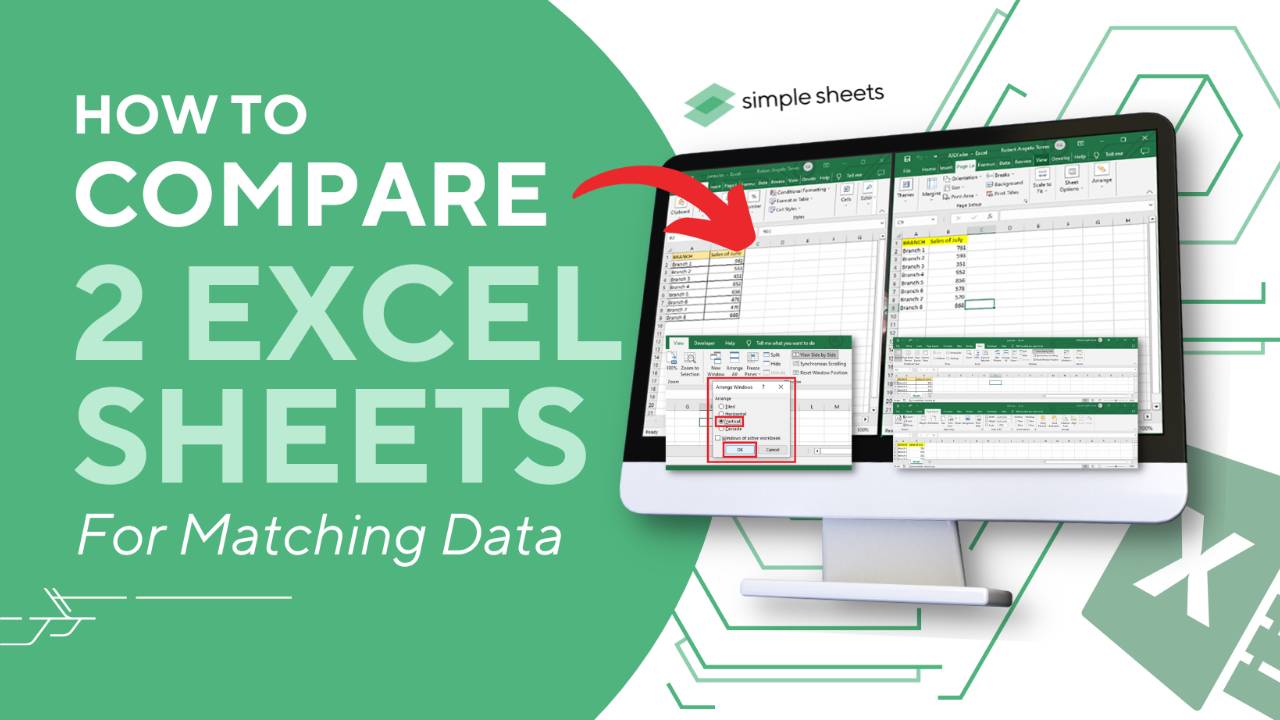Compare Data in Excel Sheets with VBA Easily

Mastering the art of data comparison between Excel sheets can significantly streamline your workflow and help you uncover discrepancies or duplicate entries quickly. Visual Basic for Applications (VBA) in Excel is a powerful tool that enables you to automate this task, making it both efficient and accurate. Let's explore how you can leverage VBA to compare data in Excel sheets easily.
The Basics of VBA in Excel

VBA, or Visual Basic for Applications, is the programming language embedded in Microsoft Office applications like Excel, enabling you to create custom functions, automate tasks, and perform data manipulation in ways that aren’t possible with regular Excel features.
Why Use VBA for Data Comparison?

- Automation: Perform repetitive tasks without manual intervention.
- Precision: Minimize errors that might occur with manual data entry or visual scanning.
- Speed: Process large datasets much faster than with manual methods.
- Customization: Tailor the comparison process to meet specific business or project needs.
💡 Note: VBA requires some programming knowledge, but with straightforward examples, anyone can start automating tasks in Excel.
Setting Up Your Excel Environment for VBA

Before diving into writing VBA code, you need to prepare your Excel environment:
- Enable Developer Tab: Go to
File>Options>Customize Ribbonand check the 'Developer' option. - Access VBA Editor: Click on 'Developer' tab, then 'Visual Basic' to open the VBA editor, or press
Alt + F11. - Set up the workbook: Have two sheets within the same workbook or in different workbooks for comparison.
Writing Your First VBA Script to Compare Sheets

Here’s a basic VBA script to get you started with comparing data across two sheets within the same workbook:
Sub CompareSheets()
Dim ws1 As Worksheet, ws2 As Worksheet
Dim lastRow1 As Long, lastRow2 As Long, row As Long
Dim colA1 As Range, colA2 As Range
Dim cell As Range
Set ws1 = ThisWorkbook.Sheets("Sheet1")
Set ws2 = ThisWorkbook.Sheets("Sheet2")
'Find last row of each sheet
lastRow1 = ws1.Cells(ws1.Rows.Count, "A").End(xlUp).Row
lastRow2 = ws2.Cells(ws2.Rows.Count, "A").End(xlUp).Row
'Set range for comparison
Set colA1 = ws1.Range("A1:A" & lastRow1)
Set colA2 = ws2.Range("A1:A" & lastRow2)
'Compare data
For Each cell In colA1
If Not IsError(Application.Match(cell.Value, colA2, 0)) Then
cell.Interior.Color = RGB(0, 255, 0) ' Green for match
Else
cell.Interior.Color = RGB(255, 0, 0) ' Red for no match
End If
Next cell
End Sub
This script will compare the data in column A of "Sheet1" with the data in column A of "Sheet2" and highlight matches in green and mismatches in red.
Notes on the Script

- The script compares data based on exact matches in column A. Adjust the column reference if you need to compare different columns.
- The comparison stops at the last non-empty cell in each column.
- This example is limited to comparing two sheets in the same workbook. For multiple sheets or workbooks, more complex handling will be necessary.
🚀 Note: This script is a basic example. For more complex scenarios, you might need to expand the code to handle unique identifiers or additional columns for comparison.
Advanced Techniques

Here are some advanced techniques for enhancing your VBA data comparison:
1. Comparing Multiple Columns

To compare more than one column, your VBA script needs to loop through additional columns:
Sub CompareMultipleColumns()
'Existing code from above...
Dim cell1 As Range, cell2 As Range, colB1 As Range, colB2 As Range
Set colB1 = ws1.Range("B1:B" & lastRow1)
Set colB2 = ws2.Range("B1:B" & lastRow2)
' Loop through both columns
For row = 1 To Application.WorksheetFunction.Min(lastRow1, lastRow2)
Set cell1 = colA1.Cells(row, 1)
Set cell2 = colA2.Cells(row, 1)
Set cell1_b = colB1.Cells(row, 1)
Set cell2_b = colB2.Cells(row, 1)
If cell1.Value = cell2.Value And cell1_b.Value = cell2_b.Value Then
cell1.Interior.Color = RGB(0, 255, 0) 'Green for match
Else
cell1.Interior.Color = RGB(255, 0, 0) 'Red for mismatch
End If
Next row
End Sub
2. Comparing Sheets Across Different Workbooks

To compare data from sheets in different workbooks:
Sub CompareDifferentWorkbooks()
Dim wb1 As Workbook, wb2 As Workbook
Dim ws1 As Worksheet, ws2 As Worksheet
Set wb1 = Workbooks("Workbook1.xlsx")
Set wb2 = Workbooks("Workbook2.xlsx")
Set ws1 = wb1.Sheets("Sheet1")
Set ws2 = wb2.Sheets("Sheet1")
'Existing comparison code...
End Sub
Remember to adjust the workbook and sheet names in the code to match your environment.
3. Adding Result Columns

You can also add columns to indicate the comparison results:
| Data Column | Comparison Result |
|---|---|
| Column A | New column 'C' with "Matched", "Mismatched", or "No Match Found" |

💡 Note: Adding result columns allows for a more detailed analysis after the comparison is complete.
Wrapping Up

By mastering VBA scripting for data comparison in Excel, you can significantly reduce the time spent on manual data review, ensuring that errors are minimized and productivity is maximized. This guide has covered the essentials, from basic comparison scripts to more advanced techniques, providing you with the tools to compare and analyze data efficiently.
Remember to test your VBA scripts in a copy of your data to avoid any accidental changes or deletions. Also, with larger datasets or complex comparison requirements, ensure your VBA code is optimized for speed and error handling to provide the best results.
Can I compare more than two sheets?

+
Yes, by using loops and dynamic sheet referencing in VBA, you can compare data across multiple sheets within the same workbook or across different workbooks.
How can I handle duplicate entries during comparison?

+
You can use collections or arrays in VBA to keep track of entries already compared, thus identifying and handling duplicates.
What if I need to compare text data case-insensitively?

+
You can modify your VBA script to use UCase() or LCase() functions to convert text to a common case before comparison.
How do I update my VBA scripts for future Excel versions?

+
Regularly review and update your scripts to ensure compatibility with newer versions of Excel, and always backup your work.



